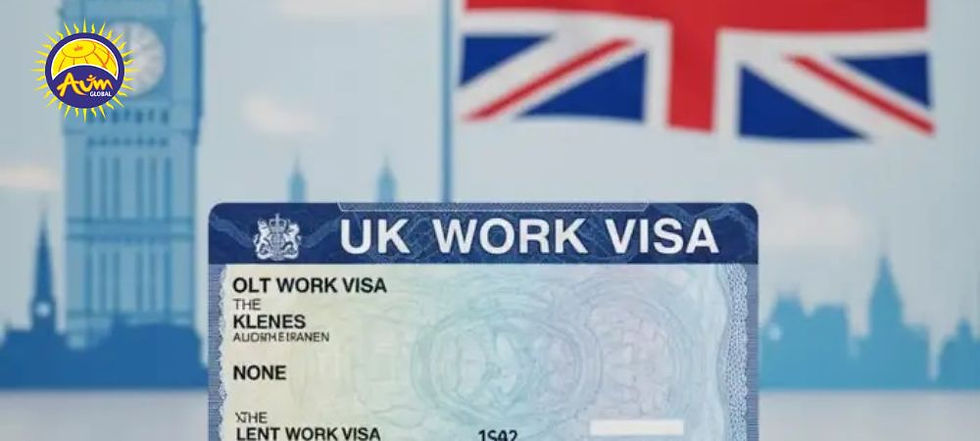Top Mistakes to Avoid When Applying for a UK Work Visa
- Jasmeet Kaur
- Aug 6, 2025
- 4 min read

Applying for a Working Visa UK can be a game-changer for your career. The United Kingdom is one of the most sought-after destinations for skilled professionals, offering global exposure, excellent salaries, and a vibrant work culture. However, even minor mistakes in your visa application can lead to delays or outright rejections.
To help you avoid these pitfalls, we’ve compiled a list of the most common mistakes applicants make when applying for a UK work visa, and how you can avoid them. Whether you're applying on your own or with the help of a migration consultant, this guide is essential reading.
1. Applying for the Wrong Type of UK Work Visa
One of the biggest mistakes people make is applying for the wrong visa category. The UK offers multiple work visa routes, including:
Skilled Worker Visa
Health and Care Worker Visa
Global Talent Visa
Graduate Visa
Temporary Worker Visa (Tier 5)
Each visa has different requirements and eligibility criteria. For instance, the Skilled Worker Visa requires a job offer from a UK-licensed sponsor, while the Global Talent Visa is geared towards leaders or potential leaders in academia, research, arts, or technology.
Tip: Understand the specific visa that suits your profile. A certified migration consultant can help you assess your eligibility and guide you in the right direction.
2. Submitting Incomplete or Incorrect Documents
UK Visas and Immigration (UKVI) is extremely particular about documentation. Missing documents, inconsistencies, or even minor errors can cause your application to be delayed or denied.
Common documentation mistakes include:
Submitting expired passports or certificates
Inaccurate job description vs. what is listed in the Certificate of Sponsorship (CoS)
Incomplete proof of English language proficiency
Insufficient maintenance funds proof (if required)
Tip: Create a checklist and verify each document thoroughly before submission. A migration consultant can help cross-check your paperwork to ensure compliance with the latest UKVI standards.
3. Incorrect or Outdated Application Form
Many applicants unknowingly fill out the wrong visa form or use outdated versions. The UK government regularly updates its visa policies, forms, and requirements.
Using an outdated form can lead to automatic rejection. Moreover, choosing incorrect details (such as visa type, sponsor details, or job role code) can raise red flags.
Tip: Always refer to the official UK government visa portal or get assistance from a qualified migration consultant who stays up to date with policy changes.
4. Ignoring the English Language Requirement
Most UK work visa categories require you to prove your English language proficiency through:
An approved English test (like IELTS for UKVI)
A degree taught in English
Nationality from a majority English-speaking country
Applicants often make the mistake of assuming their English skills are enough or submitting an unapproved test score.
Tip: Verify which English language requirements apply to your visa type. Always choose UKVI-approved test centers.
5. Not Having a Valid Certificate of Sponsorship (CoS)
For Skilled Worker Visas, a Certificate of Sponsorship (CoS) from a licensed UK employer is mandatory. Some applicants assume that a simple job offer letter is enough — it’s not.
Each CoS has a unique reference number, and it must match the job role and salary details you're applying under.
Tip: Confirm that your UK employer is on the Home Office’s list of licensed sponsors. Ensure that the CoS matches your job role (Standard Occupational Classification code) and meets salary thresholds.
6. Underestimating Financial Requirements
Depending on the visa type, you may be asked to show that you can financially support yourself upon arriving in the UK. Some applicants fail to maintain the required balance in their bank account for the stipulated period (usually 28 consecutive days).
Tip: Check the maintenance fund requirement and ensure your financial documents meet the exact format and criteria. A migration consultant can help verify if your finances are visa-compliant.
7. Failing to Disclose Previous Immigration History
Trying to hide previous visa refusals, overstays, or immigration violations (in any country) can seriously backfire. UKVI runs background checks, and lack of disclosure is treated as deception, leading to bans or long-term refusal.
Tip: Always be honest in your application. Even if you have a complex immigration history, a good migration consultant can help you address it transparently.
8. Not Following Up After Submission
Some applicants assume the process ends once the visa is submitted. However, the UK visa process might require:
Biometrics appointment
Additional document requests
Interviews (in rare cases)
Failing to respond on time can lead to automatic rejections.
Tip: Keep checking your emails (including spam folders). If you're using a migration consultant, they will track updates and follow up with UKVI on your behalf.
9. Delaying the Application Timeline
The UK work visa application process takes time — from getting a job offer, obtaining a CoS, to biometric appointments. If you start the process too late, you may miss your job start date.
Tip: Begin your visa process at least 2-3 months before your intended travel date. A good migration consultant will help you plan the timeline efficiently.
10. DIY Application Without Proper Knowledge
While it's possible to apply for a UK work visa yourself, doing so without proper knowledge increases the chances of mistakes. UK immigration laws are detailed, and even a small error can result in visa refusal.
Tip: Consulting a registered migration consultant can help ensure your application is accurate, complete, and aligned with current immigration policies.
Final Thoughts
Applying for a Working Visa UK is an important step towards a rewarding international career — but it’s also a process that demands attention to detail. Avoiding these common mistakes can significantly increase your chances of success.
If you're unsure about any part of the process, working with a trusted migration consultant can save you time, stress, and the cost of a rejected application.






Comments